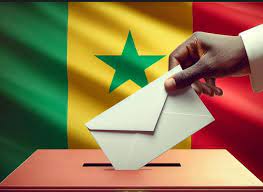7,371,894 Senegalese, spread across fourteen regions and in the diaspora are eligible to elect the fifth president in the history of independent Senegal.
It’s a crowded field of 19 candidates who have had 15 days of electoral campaign after Macky Sall gave up postponing the vote on an injunction from the constitutional court.
Sall president since 2012 is not seeking another term, leaving the field wide open for a successor.
Amadou Bâ, his handpicked candidate of the ruling coalition Benno Bokk Yaakaar (United for the same hope, in Wolof), promised prosperity while his main challenger Bassirou Diomaye Faye, released on the night of 17 March 18 with his mentor and main opponent, Ousmane Sonko, sees himself as the champions of “sovereign new Senegal”.
Other candidates such as Boubacar Camara, former Director General of Customs, aspires to “build the Senegal of the future”, while Mame Boye Diao, former Director of Lands, promised a “new Senegal”.
Aliou Mamadou Dia, candidate of the Unity and Rally Party, brandishes a “prospective vision of development” while Déthié Fall, former number two in the Rewmi party of former Prime Minister Idrissa Seck, proposed a “good Senegal to live and beautiful to see”.
Idrissa Seck, for his part, sought to establish a pact with the Senegalese, while Anta Babacar Ngom, the only woman still in the race after the withdrawal of Rose Wardini for dual citizenship, presented herself to voters as the candidate of “the next generation for a clean break with the past”.
The presidency is also sought by Mahammed Boun Abdallah Dionne, Aly Ngouille Ndiaye, Mamadou Lamine Diallo and Dr Daouda Ndiaye.
Habib Sy and Cheikh Tidiane Dièye, candidates campaigning for Bassirou Diomaye Faye from the start, finally withdrew from the race to support the latter.
The vote was initially scheduled for February 24 but was postponed to December 15 following a vote in the National Assembly decided at the initiative of the Senegalese Democratic Party (PDS) of Karim Wade whose candidacy was rejected on January 20 by the constitutional court.
Accusing two constitutional judges of corruption, the liberals obtained, with the support of the deputies the installation, on January 31, of a parliamentary commission of inquiry into the allegations and passed a law on February 5 postponing the election.
Seized by 16 candidates out of the 19, the constitutional court canceled the postponement of the vote, asking the Senegalese head of state to set a new date “as soon as possible”.
President Macky Sall was committed to implementing a new date for the polls on June 2, 2024 as well as an extension of his mandate until the installation of his successor.
However, these were rejected by the constitutional court on March 6th, which on the same day set the date of the election on March 31, as President Sall informed his government of holding the polls on March 24th.
Ultimately, the judges aligned themselves with the decision of the head of state.
While the electoral campaign was in full swing, the PDS challenged before the Supreme Court the presidential decrees having summoned the electorate to March 24 and setting the duration of the campaign at 15 days.
But the court did not rule in their favour and interim prime minister Mr Sidiki Kaba, and his Minister of the Interior, Mouhamadou Makhtar Cissé, affirmed that the poll will go ahead seamlessly on March 24th as all the necessary equipment is already in place.
The Economic Community of West African States and the European Union have sent observers to monitor the voting process.
APA


